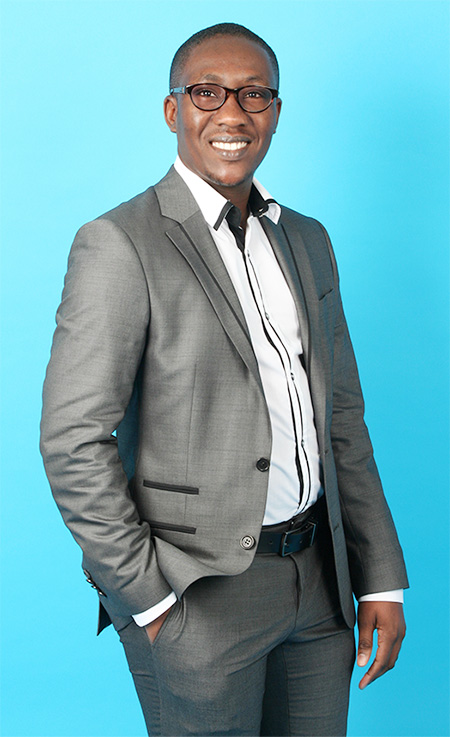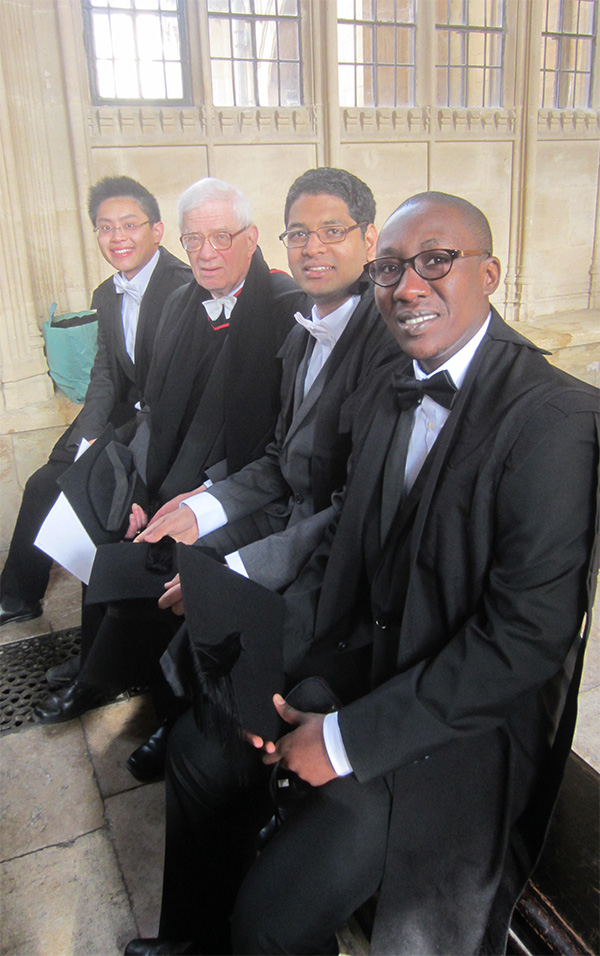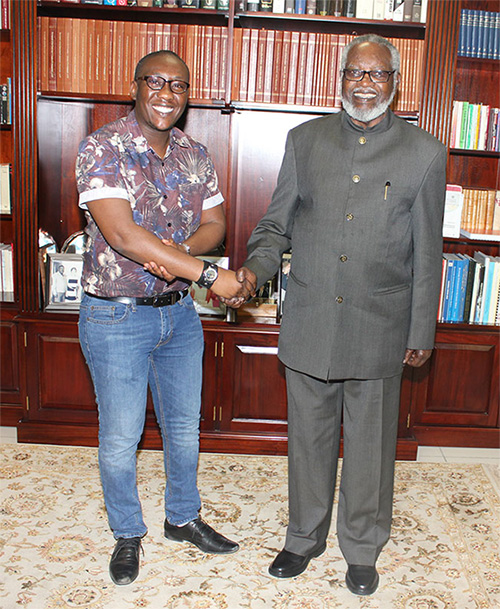1. Welcome Mr. Andreas Elombo to Namambe, you have a very interesting surname, what does it actually mean?
Thank you very much for the kind introduction. Indeed, my surname is interesting in the sense that it is so uncommon in the Ovambo community. There is only one ELOMBO family in Namibia, and that family is the one to which I belong. Your curiosity to know the meaning of my surname is justifiable due to the uncommon nature of it in our country. I had personally wondered about its meaning, the quest to which I have not been able to find an answer for a long time. I will kindly share with you once I have discovered the meaning. Thank you again for the interest.
2. How many languages do you speak?
I speak two languages: my mother tongue (Oshiwambo) and English. I am very fluent in both languages, both spoken and written. Unlike most fellows, I have immense pride in the fact that I was able to master my mother tongue, which I had learned in school. In fact, I had recently co-authored a book in Oshindonga, and then I had gone on to compile an English translation of the same book. The English version of this book is now nearing completion at the ELOC PRESS at Oniipa, Ondangwa.
3. Great! Please tell us more about yourself?
Well, I am Andreas Elombo, born to Tate Erasmus Petrus-Elombo and Meme Loide Iipinge-Elombo. My father had passed on in 2011, whereas my mother is still alive and well. I am the youngest in a family of five (5): two brothers and two sisters. I was born and raised in a village called Oniimwandi - situated just some ten kilometers north of Okahao, Tsandi constituency, Omusati region. Growing up in a Christian family (note that I do not intend to use this fact to justify my Christianity), I strive to live a committed Christian life every day. I am a member of the Evangelical Lutheran Church in Namibia (ELCIN).
4. Where did you go to school? Starting from your pre-primary till where you are currently studying?
The early years of my education were spent at a school called Nakaheke Combined School, where I completed grades from zero to ten. Upon completion of Grade 10 in 2001, I then transferred to Shaanika Nashilongo Senior Secondary School in Okahao, where I did both grades 11 and 12. I have been privileged to receive many awards of best student throughout both my primary and secondary education at the two schools where I studied. I must mention one particular award, which I received when I matriculated from Shaanika Nashilongo Senior Secondary School. This was the award of best student in the Okahao Circuit in 2003.
For tertiary education, I completed my studies, firstly at the University of Cape Town (2009), where I obtained a Bachelor of Science in electrical engineering - BScEng, and secondly at the University of Stellenbosch (2012), where I obtained a Master of Science in electrical engineering - MScEng. The undergraduate degree was awarded with a first class honour’s degree, and I have won the Dean’s merit award in 2007 and 2008 – a prestigious recognition for high performing students in the Faculty of Engineering and the Built Environment at the University of Cape Town; whereas, the Master’s degree was awarded with cum laude.
I am currently pursuing a doctoral research at the University of Oxford in England, United Kingdom, reading for the Doctor of Philosophy (PhD) in Electrical Engineering. My research focuses on developing a methodology that specifically aims to develop innovative means of providing access to electricity for rural communities in the developing nations of Africa. The main challenge is to understand the complex issue of the major energy requirements of these communities in order to devise a technology that is effectively tailored to meet such requirements.
5. What have been your favourite subjects at school and why?
Mathematics, Physical Science and English have been my favourite subjects during secondary education. Mathematics was particularly the most favourite. This is because it is a subject that does not require a lot of remembering or memorizing – it is often sufficient to simply understand the principles and then the rest can be derived from first principle theories. I enjoyed this a lot! Although many people perceive Mathematics to be such an unbecoming subject, I, to this date, perceive Mathematics as a very ‘well-behaved’ subject. I like the fact I do not have to memorize anything. Additionally, Physical Science became of great interest to me, since it explained most physical phenomena that we observe in nature, and even the things that we use in our daily lives. And then, finally, English was a subject to which I paid a lot of attention in order to ensure that I could easily master the necessary fluency in it. I became very aware that English fluency was necessary in aiding me to understand the rest of the subjects taught in English.
6. Supposed you have no obligations, what would your perfect day be like?
Disregarding the doctoral research work, a perfect day would be that which I can spend quietly on my own or with children. Such a day would be that which solely runs without interruption in my schedule – where things happen as diarised. I would then be able to read newspapers, pray upon wake-up and bedtime, and then taking a little jog after work. These are the three basic things I would never want to skip doing on a usual day.
7. What are you busy with at the moment?
I am currently in Namibia, on a research trip. As alluded to earlier on, my research aims to develop a methodology that would allow for the development of innovative means of providing access to electricity for rural communities in the developing nations of Africa. To this cause, therefore, it is imperative to carefully understand the energy requirements of these rural communities in order to devise a technology that is specifically tailored to meet such requirements.
It is very unfortunate that more than half of the Namibian population lives in the rural establishments, where lack of access to electricity is a harsh reality. I therefore believe that a staggering proportion of our population needs to have access to electricity, especially if we should speak of genuine human and economic development. I am therefore in the north conducting a survey in the Omusati region. This survey takes an audit of energy use in rural offgrid households, concentrating on basic services such as lighting, charging of cellphones, cooking, water heating, space heating and cooling, information technology equipment, and others. Visiting rural households is an arduous exercise, but I do believe it is immensely important, and hence passionate about the whole process. I plan to visit three different villages: Etunda, Uukwamatsi and Oikango, all of which are in Omusati region. The former two are in the Okahao constituency, whereas the latter is in Outapi constituency.
8. How would you describe the university where you are currently studying and what do you hope to achieve at the end of your studies?
Being among the top ten universities on our planet, the University of Oxford is indeed a prestigious university. The uniquely rich history, upon which the prestige of the Oxford University is based, distinguishes it from the rest of other universities. Its scholars are thus unique in varied ways and this is linked to the wondrous roles that they occupy in the world community when they graduate. Oxford University is a university that makes such a strong impact on the lives of its students – one will never be the same again once they assume studentship at the university. It always leaves a magical impact on the way of thinking, the way of reasoning, and the entire rationale of decision-making.
With cognizance of the rich knowledge base of Oxford University, I hope to become a refined engineer, who approaches engineering challenges with an eye that sees great opportunities of excellence in finding solutions to the real-life problems that humanity is faced with. I would like to be a research engineer who exercises innovation in engineering solutions, and to be the engineer that commits to pursuing engineering problems with confidence that there is a solution to every problem. Sometimes a solution is right on tip of our fingers, whereas, by nature of humans, we tend to want to dig far too deep for complex solutions to simple problems. Therefore, by the end of my studies, I hope to have a fully functional, optimally designed home system that could be used in offgrid rural households and even suitable for applications in business establishments in rural areas. I believe that it is possible that every African can have access to electricity. It only requires collective effort in ensuring that it becomes real.
9. If there is anything of academic interest that you have observed in the UK what is it?
There is one particular thing I have always wondered about: why does the UK teaching and learning system seems to be so effective when compared to that of my own country, for instance? What bothered me was that we make all the necessary investment in ensuring that all teaching and learning facilities are availed to the students, yet the results are seldom satisfactory. I then later came to realize that the UK has a unique teaching and learning system. Class size is considered critical in their education system. It is therefore always ensured that class size is kept as little as possible in order to make sure that there is a one-on-one relationship between the teacher and the learner. I think this is the crux of it all: class size!Additionally, research is highly encouraged amongst academics through various incentives such as lucrative sponsorship opportunities. Africa needs to learn from this culture.
10. If you are given one billion to change something in rural Namibia what would it be?
I have deep hopes for the future of planet earth, particularly that of Africa. I believe that all humans are destined to live a happy life. The past events have unfortunately dodged us, especially Africans, the opportunity to live a happy life. Our lives have now become a struggle and we are forever falling into despair. This has to change! I know that it is possible, and I am committed to playing my part in a small way in the effort to contribute toward a happy life for all Africans and the entire humanity. Coming back to your question, the very first thing that comes to my mind is that of community education and development. This entails proper upbringing of children. If I were given such amount of money, I would set up an organization that will train children from very early ages in order to ensure that our society eventually becomes a society of well-educated citizens. This would be my plan. In fact, such an idea is already one of my personal targets later in my life. Just recently (November 16, 2014) I had an intimate talk with all the children in my congregation, talking to them about ‘being a good child’ – it was a very humbling opportunity and I am positive that a few of these children shall grasp the essence of the things we discussed.
11. What message would you like to give to the youth that are still looking for careers in electrical engineering?
I would like to announce to my fellow youth that there is a multitude of challenges facing the electricity industry, both in Namibia and in the entire world. There is a massive revolution in the electricity industry. The demand to come up with efficient electrical systems is enormous. I can therefore announce to all the fellows who are looking to take up studies in electrical engineering that there are many opportunities and that they should join in fast and quick. The revolution is in a state of emergency! We need to ensure that all humanity gains access to electricity.
12. Finally is there something that you would like to share with the people of Namibia at this juncture?
I have covered much of everything already. However, I wish to call on all Namibians to join hands in the quest for a better Namibia. All persons have a role to play. Those small contributions will eventually make the better Namibia that we all long for. I must thank our current government for maintaining peace in our country. Peace is what we need as we march forward. Again, I repeat that I have a lot of confidence in the future of humanity. Let us all get busy and build Namibia. I would like to share a poem I had written recently. It talks about building Africa.
HARD-WORK IS NOW |
It is morning
The sun is up
The day is growing on
It is time to wake up and go
Work is calling
Africa's chores are due
Hard-work is now
Are you prepared?
Is your toolkit set?
The day is growing on
It is time to wake up and go
Work is calling
Africa's chores are due
Hard-work is now
Everyone's hand is needed
The work is for all
The day is really growing on
It is time to wake up and go
Work is calling
Africa's chores are due
Hard-work is now
Is your neighbour awake?
Are their toolkits set?
The day is growing on
It is time to wake up and go
Work is calling
Africa's chores are due
Hard-work is now
Africa, my home!
The richest on earth!
Proud to be an African family!
We are ready to nurture you!
Our teams are set to go!
The work has to begin! |
Are you on board?
Are you up and ready?
The day is growing on
It is time to wake up and go
Work is calling
Africa's chores are due
Hard-work is now
Let us form teams
It has to be team-based
Because the day is really growing on
It is time to wake up and go
Work is calling
Africa's chores are due
Hard-work is now
Africa is ours
We are one African family
Let us form teams and work together
Because the day is just growing on fast
It is time to wake up and go
Work is calling
Africa's chores are due
Hard-work is now
Off we go, everyone!
Let us build our Africa
We can do it together
The day is growing on
It is time to wake up and go
Work is calling
Africa's chores are due
Hard-work is now |
Compiled by: ANDREAS ELOMBO, August 08 2014 |

Figure 1: Pictured early this year 2014 in Oxford, United Kingdom

Figure 2: Matriculation ceremony at the University of Oxford in March 2014

Figure 3: Courtesy meeting with the Founding President of the Republic of Namibia, November 2014
|

